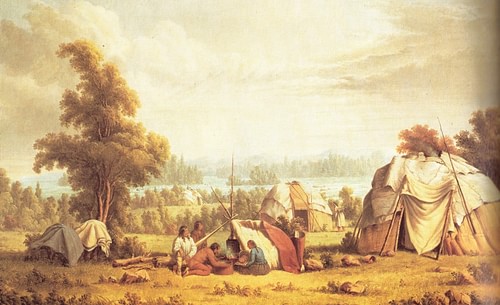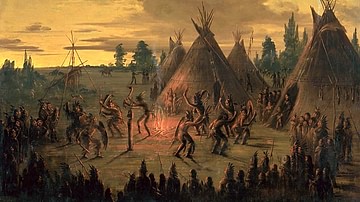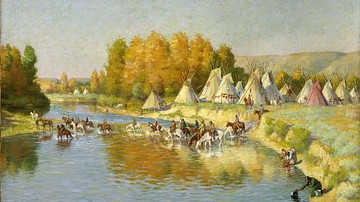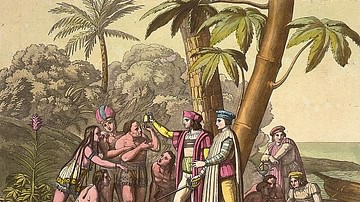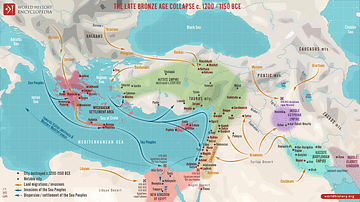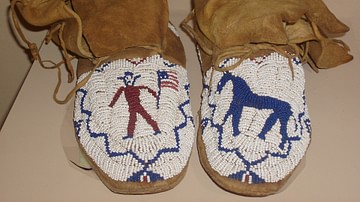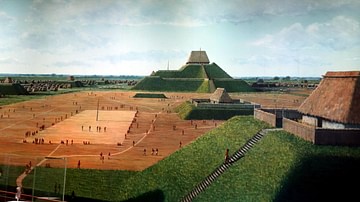Mondamin (also given as Mon-Daw-Min, The Gift of Corn, and The Origin of Corn) is a tale from the Ojibwe Nation on how the people received corn from the Great Spirit through the vision quest of the young man, Wunzh, and his acts of selflessness. The story is understood by anthropologists to explain how the people adopted agriculture.
To the Ojibwe themselves, however, the story is understood as cultural history. Whether a young man named Wunzh actually performed the deeds described and whether there actually was a celestial visitor who became corn are questions only non-Natives have occupied themselves with. In the lore of the Ojibwe, the celestial visitor is recognized as an avatar of the Great Spirit, bringing an essential gift to the people who are a part of the whole of creation. The title of the work – Mondamin – comes from the Ojibwe word for corn meaning "spirit grain" – as in a food source given to the people by the Great Spirit but also understood as a resource which nourishes the spirit of the people.
The Ojibwe – also known as the Chippewa and Saulteaux – are a North American Native nation now living in the southern parts of Canada and the northern United States. Their name means "true people" or "original people" or "the original ones." They once occupied the regions of the Great Lakes, Minnesota, Michigan, Wisconsin, Ontario, and Quebec, initially as hunter-gatherers but, later, supplementing their resources through agriculture and, especially, through the cultivation of maize (corn), which could be used to make several different variations of meals.
Corn was also used medicinally to treat a number of health problems ranging from urinary tract infections to high blood pressure. Every Native American nation had its own story of how the Great Spirit gave corn to the people, but in every one, the underlying reason is the same: because the Creator God cared for the people so deeply that a sustainable resource was given for their survival.
The Sioux story of The Gift of Corn is a well-known tale of how maize was given to the people by the Great Spirit, but there are many others which include the figure of the Old Woman Who Never Dies, a corn spirit, or the deification of corn itself. In many stories on the origin of corn, the supernatural entity who brings it is a woman – as in the Abenaki tale of the lovely young woman who sacrifices herself for the good of the old man and his people – but, in this tale, the gift-giver is male, a youth of extraordinary beauty, clothed in green and gold.
Commentary
The story highlights several important aspects of Native American culture, not only specific to the Ojibwe but also generally. The tale begins with a poor father who strives to provide for his family. This detail serves to emphasize the responsibility of the head of the household in Native American cultures to provide for his family and, by extension, the wider community, and the same is true of the man’s eldest son who wants to help his father, not out of personal pride, but to assist in feeding and providing for the family and contributing to the greater good.
The story includes several important aspects of the rite of passage of a young member of the tribe historically observed – and still observed – by Native Americans, such as the creation of a sweat lodge for purification prior to the young person embarking on a vision quest to recognize their purpose in life and, hopefully, returning with spiritual insight into their place within the community and, equally important, an understanding of the gifts they have to offer others.
In this story, as in The Man Who Wrestled with a Ghost, the supernatural entity challenges the young man to a test of physical strength through a series of wrestling matches which, as in any similar tale from any tribal nation, is understood as a test of character and spiritual power. When the young man bests the entity, and then faithfully fulfills the promise he has made, he is rewarded with the life-sustaining corn and so the story serves the purpose of impressing upon an audience several important cultural values, not the least of which are self-sacrifice, personal integrity, and self-improvement for the greater good.
Text
The following text comes from the site Learning to Give, which reprints the 1956 version of Mon-Daw-Min or the Origin of Indian Corn: An Ojibwa Tale, originally published through Michigan State University Press in H. R. Schoolcraft’s Indian Legends and cross-checked with the same story given as The Gift of Corn from Native American Myths & Legends, edited by J. K. Jackson.
In times past, a poor Indian was living with his wife and children in a beautiful part of the country. He was not only poor, but inexpert in procuring food for his family, and his children were all too young to give him assistance. Although poor, he was a man of a kind and contented disposition. He was always thankful to the Great Spirit for everything he received.
The same disposition was inherited by his eldest son, who had now arrived at the proper age to undertake the ceremony of the Ke-ig-uish-im-o-win, or fast, to see what kind of a spirit would be his guide and guardian through life. Wunzh, for this was his name, had been an obedient boy from his infancy, and was of a pensive, thoughtful, and mild disposition, so that he was beloved by the whole family.
As soon as the first indications of spring appeared, they built him the customary little lodge, at a retired spot some distance from their own, where he would not be disturbed during this solemn rite. In the meantime, he prepared himself, and immediately went into it and commenced his fast. The first few days he amused himself in the mornings by walking in the woods and over the mountains, examining the early plants and flowers, and in this way prepared himself to enjoy his sleep, and, at the same time, stored his mind with pleasant ideas for his dreams.
While he rambled through the woods, he felt a strong desire to know how the plants, herbs, and berries grew, without any aid from man, and why it was that some species were good to eat, and others possessed medicinal or poisonous juices.
He recalled these thoughts to mind after he became too languid to walk about and had confined himself strictly to the lodge; he wished he could dream of something that would prove a benefit to his father and family, and to all others. "True!" he thought, "the Great Spirit made all things, and it is to him that we owe our lives. But could he not make it easier for us to get our food, than by hunting animals and taking fish? I must try to find out this in my visions."
On the third day he became weak and faint and kept his bed. He fancied, while thus lying, that he saw a handsome young man coming down from the sky and advancing towards him. He was richly and gaily dressed, having on a great many garments of green and yellow colors, but differing in their deeper or lighter shades. He had a plume of waving feathers on his head, and all his motions were graceful.
"I am sent to you, my friend," said the celestial visitor, "by that Great Spirit who made all things in the sky and on the earth. He has seen and knows your motives in fasting. He sees that it is from a kind and benevolent wish to do good to your people, and to procure a benefit for them, and that you do not seek for strength in war or the praise of warriors. I am sent to instruct you and show you how you can do your kindred good."
He then told the young man to arise, and prepare to wrestle with him, as it was only by this means that he could hope to succeed in his wishes. Wunzh knew he was weak from fasting, but he felt his courage rising in his heart, and immediately got up, determined to die rather than fail. He commenced the trial, and, after a protracted effort, was almost exhausted, when the beautiful stranger said, "My friend, it is enough for once; I will come again to try you;" and, smiling on him, he ascended in the air in the same direction from which he came.
The next day the celestial visitor reappeared at the same hour and renewed the trial. Wunzh felt that his strength was even less than the day before, but the courage of his mind seemed to increase in proportion as his body became weaker. Seeing this, the stranger again spoke to him in the same words he used before, adding, "Tomorrow will be your last trial. Be strong, my friend, for this is the only way you can overcome me and obtain the boon you seek."
On the third day he again appeared at the same time and renewed the struggle. The poor youth was very faint in body, but grew stronger in mind at every contest, and was determined to prevail or perish in the attempt. He exerted his utmost powers, and after the contest had been continued the usual time, the stranger ceased his efforts and declared himself conquered. For the first time he entered the lodge, and sitting down beside the youth, he began to deliver his instructions to him, telling him in what manner he should proceed to take advantage of his victory.
"You have won your desires of the Great Spirit," said the stranger. "You have wrestled manfully. Tomorrow will be the seventh day of your fasting. Your father will give you food to strengthen you, and as it is the last day of trial, you will prevail. I know this, and now tell you what you must do to benefit your family and your tribe."
"Tomorrow," he repeated, "I shall meet you and wrestle with you for the last time; and, as soon as you have prevailed against me, you will strip off my garments and throw me down, clean the earth of roots and weeds, make it soft, and bury me in the spot. When you have done this, leave my body in the earth, and do not disturb it, but come occasionally to visit the place, to see whether I have come to life, and be careful never to let the grass or weeds grow on my grave. Once a month cover me with fresh earth. If you follow my instructions, you will accomplish your object of doing good to your fellow-creatures by teaching them the knowledge I now teach you."
He then shook him by the hand and disappeared.
In the morning the youth's father came with some slight refreshments, saying, "My son, you have fasted long enough. If the Great Spirit will favor you, he will do it now. It is seven days since you have tasted food, and you must not sacrifice your life. The Master of Life does not require that."
"My father," replied the youth, "wait till the sun goes down. I have a particular reason for extending my fast to that hour." "Very well," said the old man, and departed [with the food].
At the usual hour of the day the sky-visitor returned, and the trial of strength was renewed. Although the youth had not availed himself of his father's offer of food, he felt that new strength had been given to him, and that exertion had renewed his strength and fortified his courage. He grasped his angelic antagonist with supernatural strength, threw him down, took from him his beautiful garments and plume, and finding him dead, immediately buried him on the spot, taking all the precautions he had been told of, and being very confident, at the same time, that his friend would again come to life. He then returned to his father's lodge and partook sparingly of the meal that had been prepared for him. But he never for a moment forgot the grave of his friend.
He carefully visited it throughout the spring, and weeded out the grass, and kept the ground in a soft and pliant state. Very soon he saw the tops of the green plumes coming through the ground; and the more careful he was to obey his instructions in keeping the ground in order, the faster they grew. He was, however, careful to conceal the exploit from his father. Days and weeks had passed in this way. The summer was now drawing towards a close, when one day, after a long absence in hunting, Wunzh invited his father to follow him to the quiet and lonesome spot of his former fast.
The lodge had been removed, and the weeds kept from growing on the circle where it stood, but in its place stood a tall and graceful plant, with bright-colored silken hair, surmounted with nodding plumes and stately leaves, and golden clusters on each side. "It is my friend," shouted the lad; "it is the friend of all mankind. It is Mondamin (the name for corn). We need no longer rely on hunting alone; for, as long as this gift is cherished and taken care of, the ground itself will give us a living."
He then pulled an ear. "See, my father," said he, "this is what I fasted for. The Great Spirit has listened to my voice, and sent us something new, and henceforth our people will not alone depend upon the chase or upon the waters."
He then communicated to his father the instructions given him by the stranger. He told him that the broad husks must be torn away, as he had pulled off the garments in his wrestling; and having done this, directed him how the ear must be held before the fire till the outer skin became brown, while all the milk was retained in the grain. The whole family then united in a feast on the newly grown ears, expressing gratitude to the Merciful Spirit who gave it. So, corn came into the world, and has ever since been preserved.
